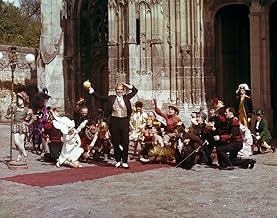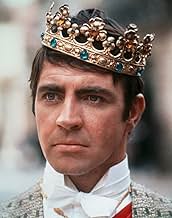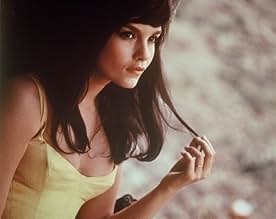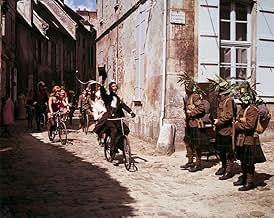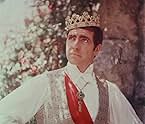CALIFICACIÓN DE IMDb
7.3/10
4.6 k
TU CALIFICACIÓN
Durante la Primera Guerra Mundial, un soldado británico, enviado a una ciudad francesa para buscar la presencia del enemigo, es confundido con un rey por pacientes de un manicomio.Durante la Primera Guerra Mundial, un soldado británico, enviado a una ciudad francesa para buscar la presencia del enemigo, es confundido con un rey por pacientes de un manicomio.Durante la Primera Guerra Mundial, un soldado británico, enviado a una ciudad francesa para buscar la presencia del enemigo, es confundido con un rey por pacientes de un manicomio.
- Dirección
- Guionistas
- Elenco
Pier Paolo Capponi
- Un Officier Anglais
- (as Paolo Capponi)
Georges Adet
- L'aliéné-docteur
- (sin créditos)
Jackie Blanchot
- Le Gabalou
- (sin créditos)
Robert Blome
- Un aliéné
- (sin créditos)
Jean-Marie Bon
- Un aliéné
- (sin créditos)
- Dirección
- Guionistas
- Todo el elenco y el equipo
- Producción, taquilla y más en IMDbPro
Opiniones destacadas
De Broca's delightful and surreal anti-war fantasy quickly attained a cult status when it was first released, but in recent years it has dropped more and more out of sight. A shame, because it is a charming film, the whimsical, romantic nature of which is entirely French. Even though the underlying message, that of preferring one kind of insanity to another is a simple, absurdist one, the viewer is still carried along by the Gaullic charm of it all.
As the much-put-upon martial ornithologist, It's not just because Bates is the only English member of the cast that one is aware of some awkwardness in his casting. For English cinema goers in particular, familiar with his career, his usual jocular masculinity is hard to reconcile with an child-like character, swept along by events. Those who remember Bates and Oliver Reed wrestling nude in 'Women in Love' (1962) from the same period, or his cocky Vic in 'A Kind of Loving' (1962), may bulk at Bates portraying such a confused innocent. Having said that, Bates' actual performance is balanced and restrained, all of a piece with the rest of the cast.
'King of Hearts' is primarily an ensemble piece. Many of the film's most delightful moments spring from the fancy-filled and flirtatious lunatics who quickly fill the streets, shops and occupations left by the fleeing villagers, their interaction with each other, and Plumpick. This world of fantasy is curtailed by the village walls, which physically as well as mentally encircle their environment. Outside is reality (no matter how ludicrously it is presented), conflict, death. Inside the walls is harmony of sorts, life celebrated. This distinction between outside and inside is made clear in the film. As soon as Plumpick attempts to ride a horse back into the real world for help, the music and the mass accompaniment of him by the inmates has to end until he is obliged to return.
As the 'King of Hearts' Plumpick is at the center of his motley 'people', as well as of Coquelicot's (Geneviève Bujold) affections. Once he awards himself his name, in a panic and on the run, his 'subjects' call out for him. He is promptly 'crowned' (both by banging his head, inducing his initial confusion, and though acquiring his 'kingship'). He is awarded a bride, and accepted as an unique traveller into the society of the amiably mad. Their acceptance of him anticipates the final scene of the film, when a chastened Plumpick re-admits himself into their company, having rejected the larger insanity of warfare.
It's fitting in a way that the least successful parts of the film lay outside of the village, where comic stereotypes replace whimsy and the comedy is drawn with much broader strokes. In particular Colonel MacBibenbrook (Adolfo Celi, better known as Emil Largo in 'Thunderball') is uncomfortably close to parody, and his part would have been much better cast with an actor like Trevor Howard who could excel with a line in ironic bombast. The Germans fare no better and, although amusing and lightweight in their capers, one misses the delicacy with which the lunatics are portrayed. One suspects that De Broca associates more with the geniality of the insane, as we all do given the options, and this sympathy is reflected on screen
Tellingly, the lunatics are not completely oblivious to the hostile world which surrounds them, although they are content to ignore the immediate threat of destruction and Plumpick's warnings. At the end of the film, once the opposing forces have symbolically destroyed themselves, Marcel says:'I'm tired of this game, let's go back to our rooms'. With deliberate sadness, they divest themselves of their play robes and return to their asylum, a divestment scene at the same time quiet, serious and eminently sane. It is clear that they are mad - but not crazy.
As the much-put-upon martial ornithologist, It's not just because Bates is the only English member of the cast that one is aware of some awkwardness in his casting. For English cinema goers in particular, familiar with his career, his usual jocular masculinity is hard to reconcile with an child-like character, swept along by events. Those who remember Bates and Oliver Reed wrestling nude in 'Women in Love' (1962) from the same period, or his cocky Vic in 'A Kind of Loving' (1962), may bulk at Bates portraying such a confused innocent. Having said that, Bates' actual performance is balanced and restrained, all of a piece with the rest of the cast.
'King of Hearts' is primarily an ensemble piece. Many of the film's most delightful moments spring from the fancy-filled and flirtatious lunatics who quickly fill the streets, shops and occupations left by the fleeing villagers, their interaction with each other, and Plumpick. This world of fantasy is curtailed by the village walls, which physically as well as mentally encircle their environment. Outside is reality (no matter how ludicrously it is presented), conflict, death. Inside the walls is harmony of sorts, life celebrated. This distinction between outside and inside is made clear in the film. As soon as Plumpick attempts to ride a horse back into the real world for help, the music and the mass accompaniment of him by the inmates has to end until he is obliged to return.
As the 'King of Hearts' Plumpick is at the center of his motley 'people', as well as of Coquelicot's (Geneviève Bujold) affections. Once he awards himself his name, in a panic and on the run, his 'subjects' call out for him. He is promptly 'crowned' (both by banging his head, inducing his initial confusion, and though acquiring his 'kingship'). He is awarded a bride, and accepted as an unique traveller into the society of the amiably mad. Their acceptance of him anticipates the final scene of the film, when a chastened Plumpick re-admits himself into their company, having rejected the larger insanity of warfare.
It's fitting in a way that the least successful parts of the film lay outside of the village, where comic stereotypes replace whimsy and the comedy is drawn with much broader strokes. In particular Colonel MacBibenbrook (Adolfo Celi, better known as Emil Largo in 'Thunderball') is uncomfortably close to parody, and his part would have been much better cast with an actor like Trevor Howard who could excel with a line in ironic bombast. The Germans fare no better and, although amusing and lightweight in their capers, one misses the delicacy with which the lunatics are portrayed. One suspects that De Broca associates more with the geniality of the insane, as we all do given the options, and this sympathy is reflected on screen
Tellingly, the lunatics are not completely oblivious to the hostile world which surrounds them, although they are content to ignore the immediate threat of destruction and Plumpick's warnings. At the end of the film, once the opposing forces have symbolically destroyed themselves, Marcel says:'I'm tired of this game, let's go back to our rooms'. With deliberate sadness, they divest themselves of their play robes and return to their asylum, a divestment scene at the same time quiet, serious and eminently sane. It is clear that they are mad - but not crazy.
"Le Roi De Coeur" belongs to a handful of French movies which are much more known and praised abroad (another example comes to mind:"Cybèle Ou Les Dimanches De Ville D'Avray").
In France the audience snubbed it and the critics panned it;De Broca was famous for his entertaining (not meant pejoratively)works ,such movies as "Cartouche" "L'Homme De Rio" "Les Tribulations D'Un "Chinois" En Chine" were huge blockbusters and the people were not ready for "something different"..
When he tried something different,nobody understood and the director felt compelled to return to more "accessible" stories ("Le Diable Par La queue" etc);that's why" Le Roi De Coeur" has remained unique ,very original;in the past of the French cinema,to my knowledge ,only one movie mixed the war and an insane asylum (Raymond Bernard's "Un Ami Viendra Ce Soir");Bernard's movie had good potential (who are the loonies?) which he lost in a trite patriotic finale.
Broca goes all the way:in a world gone mad, the only safe place,where people have remained sensible,is an insane asylum!the last picture -which may have inspired the ending of the much more conventional "rain man" -is revealing;this is one of the most extraordinary demonstration of the absurdity of war .
Broca had done what Richard Lester tried to do (but was not able to)in his "how I won the war" :a crazy movie in which madness rules but has its own internal logic ;terrific French cast plus English Alan Bates -who loves birds and thus is a potential pacifist plus Italian Adolfo "Largo" Celi as an English major plus gorgeous Canadian Genevieve Bujold as Coquelicot (=Poppy!).
In France the audience snubbed it and the critics panned it;De Broca was famous for his entertaining (not meant pejoratively)works ,such movies as "Cartouche" "L'Homme De Rio" "Les Tribulations D'Un "Chinois" En Chine" were huge blockbusters and the people were not ready for "something different"..
When he tried something different,nobody understood and the director felt compelled to return to more "accessible" stories ("Le Diable Par La queue" etc);that's why" Le Roi De Coeur" has remained unique ,very original;in the past of the French cinema,to my knowledge ,only one movie mixed the war and an insane asylum (Raymond Bernard's "Un Ami Viendra Ce Soir");Bernard's movie had good potential (who are the loonies?) which he lost in a trite patriotic finale.
Broca goes all the way:in a world gone mad, the only safe place,where people have remained sensible,is an insane asylum!the last picture -which may have inspired the ending of the much more conventional "rain man" -is revealing;this is one of the most extraordinary demonstration of the absurdity of war .
Broca had done what Richard Lester tried to do (but was not able to)in his "how I won the war" :a crazy movie in which madness rules but has its own internal logic ;terrific French cast plus English Alan Bates -who loves birds and thus is a potential pacifist plus Italian Adolfo "Largo" Celi as an English major plus gorgeous Canadian Genevieve Bujold as Coquelicot (=Poppy!).
10RDenial
As I was reading through the comments here for "King of Hearts" I noticed two different schools of thought on the film. Many, like myself, have fond memories of seeing this film in the 60s and 70s and were delighted by it. The other comments come from younger viewers who see this film as being "dated" and not that funny, yet worthwhile viewing. At first I was a little miffed at this generations comments about a gem of my generation, until it dawned on me that they were somewhat correct. The film is a bit dated because they just do not make films like this anymore. It was never meant to be knee slapping funny. The humor was a non-intrusive "gentle" humor that seems to be a foreign concept in this day and age. Another reason many younger viewers do not "get" this film is because one of the themes here is non-conformity. This was a crucial concern of those growing up in the 60s. We wanted our individuality to show and not be just a number. Society has did a 180 since then. Today people are more concerned with fitting in than standing out. So yes, this film possibly is a bit dated. It is a bit of movie magic from a far simpler time and I have a feeling that there are a lot of people under 30 who would not see this as dated at all. King of Hearts is one of a small handful of films that celebrates the simple magic of being alive. Come and experience it.
My mother had seen King of Hearts years ago, when she was in college. When I was about seven or eight (a few years ago, she rented the movie. Most of the movie is in French and it had subtitles, so even though I could just barely understand what was being said, I had a wonderful understanding of what was going on. It's the type of movie where what's on screen is enough to let a person get a gist of the scene. When I first saw the movie, I remembered how lovely the music was, how I grew to love the "crazy" people from the asylum, and how beautiful the movie was. When my mom bought the movie, we watched it constantly. I still watch it at least once a month. It's one of my favorite movies. I really do love the music. For me, it simulates fun insanity. I love every single aspect of King of Hearts. If you ever have a chance to see it, then go! Go see King of Hearts!
A charming film, first, for the contained naked truth. Second, for status of reflection in mirror of near reality, in too many senses. Not the last, for acting and the veil of innocence and cold / precise perspective about life, freedom, expectations, fears , joy in pure state. A film deserving to be loved and seen often. As a sort of cure. So, Alan Baits and Genevieve Bujold. And the others. A cold perspective, seeming a kind of verdict, about reality and its large illusions.
¿Sabías que…?
- TriviaWhile the film was a flop with critics and audiences in France, it was an unexpected cult success in the USA, running for years in Boston repertory film houses circa 73-76. Midnight showings around the country made it an early cult film, like El show de terror de Rocky (1975), Cabeza de borrador (1977), El Topo (1970), Más allá del valle de las muñecas (1970), etc...
- ErroresThe stairs/ladder Plumpick uses to climb to the top of the blockhouse appear out of nowhere.
- Citas
[last lines]
Le Duc de Trèfle: The most beautiful journeys are taken through the window.
- Créditos curiososThe credits rise and then fall to coincide with the sound of a large clock.
- ConexionesReferenced in Rescatando al soldado Ryan (1998)
- Bandas sonorasLa Valse Tordue
Written and Performed by Georges Delerue Et Son Orchestre
Selecciones populares
Inicia sesión para calificar y agrega a la lista de videos para obtener recomendaciones personalizadas
- How long is King of Hearts?Con tecnología de Alexa
Detalles
- Fecha de lanzamiento
- Países de origen
- Idiomas
- También se conoce como
- King of Hearts
- Locaciones de filmación
- Senlis, Oise, Francia(insane asylum and town square scenes, Senlis is 55 km north of Paris)
- Productoras
- Ver más créditos de la compañía en IMDbPro
Taquilla
- Total en EE. UU. y Canadá
- USD 17,646
- Fin de semana de estreno en EE. UU. y Canadá
- USD 3,443
- 25 feb 2018
- Total a nivel mundial
- USD 18,130
Contribuir a esta página
Sugiere una edición o agrega el contenido que falta

Principales brechas de datos
What is the Italian language plot outline for Rey de corazones (1966)?
Responda

![Trailer [OV]](https://m.media-amazon.com/images/M/MV5BOTgyNWQ0NTctZWY1Mi00NzY1LTljNWItMWFlNjI2MDMzM2NmXkEyXkFqcGdeQXRyYW5zY29kZS13b3JrZmxvdw@@._V1_QL75_UY281_CR79)

